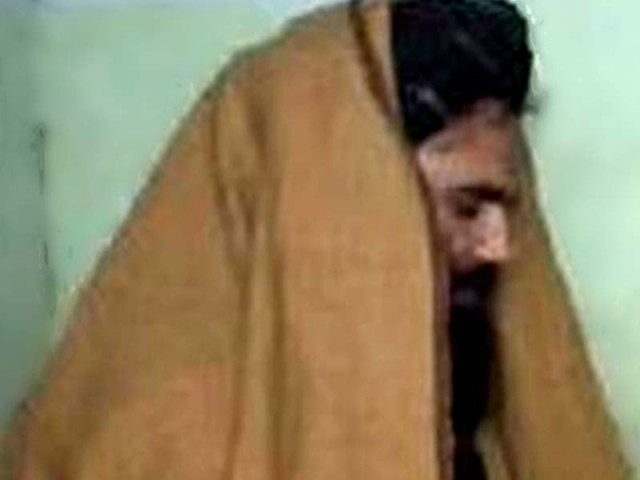In NYT opinion piece, Haqqani network chief spells out vision of postwar Afghanistan
Sirajuddin Haqqani says US welcome to play role in reconstruction after withdrawing troops

Only available picture of Sirajuddin Haqqani. PHOTO: REWARD FOR JUSTICE
“We are about to sign an agreement with the United States and we are fully committed to carrying out its every single provision, in letter and spirit,” writes Haqqani Network chief Sirajuddin Haqqani, who is also deputy commander of the Afghan Taliban, in an opinion piece, “What We, the Taliban, Want”, in The New York Times.
“Achieving the potential of the agreement, ensuring its success and earning lasting peace will depend on an equally scrupulous observance by the United States of each of its commitments. Only then can we have complete trust and lay the foundation for cooperation — or even a partnership — in the future,” he writes.
Sirajuddin Haqqani is also the deputy of Taliban chief Maulvi Hibatullah Akhundzada, who was named Ameerul Momineen (commander of the faithful) following the death of Mullah Akhtar Mansoor in a US drone strike in May 2016.
In the article, the Taliban No 2 also gives a brief overview of the peace talks between his group and US negotiators, led by Zalmay Khalilzad, in Doha, Qatar. He says the Taliban didn’t trust the Americans after 18 years of war and several previous futile attempts at negotiations.
“Nevertheless, we decided to try once more. The long war has exacted a terrible cost from everyone. We thought it unwise to dismiss any potential opportunity for peace no matter how meager the prospects of its success,” writes Sirajuddin, who was designated by the US State Department a “Specially Designated Global Terrorist” in 2008 and carries up to $10 million bounty on his head.
“For more than four decades, precious Afghan lives have been lost every day. Everyone has lost somebody they loved. Everyone is tired of war. I am convinced that the killing and the maiming must stop.”
He claims credit for the success of the peace talks as the Taliban preserved and pursued dialogue despite several roadblocks. He also concedes that there were divisions within the Taliban over the peace talks. “We stuck with the talks despite recurring disquiet and upset within our ranks over the intensified bombing campaign against our villages by the United States and the flip-flopping and ever-moving goal posts of the American side,” he writes.
The Taliban negotiation team, led Mullah Abdul Ghani Baradar and Sher Muhammad Abas Stanekzai, has been engaged in talks with the Khalilzad-led American negotiators in Doha for the past 18 months.
Sirajuddin seeks to allay concerns about the kind of government the Taliban envision following the withdrawal of US forces from Afghanistan.
He says it will be a consensus government, but advises against setting preconditions during an intra-Afghan dialogue which is supposed to follow the formal signing of a peace deal between the Taliban and the United States.
“We are committed to working with other parties in a consultative manner of genuine respect to agree on a new, inclusive political system in which the voice of every Afghan is reflected and where no Afghan feels excluded,” he writes. “If we can reach an agreement with a foreign enemy, we must be able to resolve intra-Afghan disagreements through talks.”
Sirajuddin is confident that in a “liberated” Afghanistan, all Afghans would find a way to build an Islamic system in which all Afghans have equal rights, where the rights of women — from the right to education to the right to work — are protected.
The Taliban No 2 also refers to concerns voiced by different regional and international players about the use of Afghan soil by “disruptive groups” to imperil regional and international security.
“…these concerns are inflated: Reports about foreign groups in Afghanistan are politically motivated exaggerations by the warmongering players on all sides of the war,” he writes, but adds that they “will take all measures in partnership with other Afghans to make sure the new Afghanistan is a bastion of stability and that nobody feels threatened on our soil”.
Sirajuddin says the Taliban are ready to work with all international players on the basis of mutual respect for reconstruction in Afghanistan. They will even welcome the United States if it wants to play a role in rebuilding the postwar Afghanistan.
The Taliban No 2 also acknowledges that the new Afghanistan cannot afford to live in isolation and will have relations with the international community on the basis of mutual respect for each other’s sovereignty. “We will remain committed to all international conventions as long as they are compatible with Islamic principles.”
The Haqqani Network was founded by Jalaluddin Haqqani, an Afghanistan-battlefield commander from the 1980s who fought against the Soviet Union. The United States believed the Haqqanis were operating out of North Waziristan, an erstwhile tribal region of Pakistan.
The Pakistani military conducted a massive military operation in Waziristan in 2014, comprehensively defeating the Taliban and decimating their command and control centre and bomb-making factories.
According to rewardsforjustice.net, “The Haqqani Network is allied with the Afghan Taliban and al-Qaida and seeks to reestablish Taliban rule in Afghanistan.”



















COMMENTS
Comments are moderated and generally will be posted if they are on-topic and not abusive.
For more information, please see our Comments FAQ